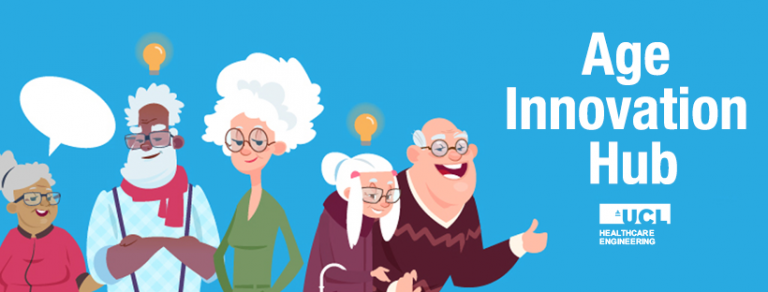Report: Reflecting on the Age Innovation Hub – what we learned from crowdsourcing ideas
14 June 2022
Launched in late 2020 and running to mid-2021, the Age Innovation Hub was a digital platform that crowdsourced ideas and needs for technologies to support healthy ageing. Read our report about our experience and the learnings.

The Age Innovation Hub platform was the first of its kind at UCL. Using the Medallia Crowdicity software, we built an accessible online forum where members of the public could directly share their ideas and feedback with UCL researchers. We also invited UCL researchers to get involved by submitting their own experiences and engaging in the discussion.
The vision was that the insights gleaned from this platform would inform our research into healthy ageing – making sure that we are focusing on delivering usable solutions to real problems.
Read the full Age Innovation Hub report
While the platform was open to everyone, we were particularly keen to hear from older people themselves, their carers and family members, and healthcare professionals.
Why did we focus on the topic of healthy ageing?
Thanks to advances in healthcare and living standards, people are living longer than ever in the UK and many parts of the world. An ageing population brings new benefits and challenges
The UK government and the NHS have made it a priority to tackle the challenges associated with an ageing society – which include struggling with deteriorating health, loneliness and difficulty accessing services.
As healthcare engineers, we can contribute by ensuring we develop technologies that help people live healthy lives from the moment they're born through to later life. In order to develop the most effective technologies that we can, it’s crucial we take a collaborative, multidisciplinary approach – harnessing the expertise of older people themselves.
Why did we engage with the public in this way?
We know from our own experience that many of the same people tend to engage with universities – while a large swath of the population never does.
We’re all growing older each day, so we’re all experts in ageing!
We wanted to tap into the expertise of people from all walks of life, who may have never engaged with research and make it as effortless as possible for them to take part.
The nature of the Age Innovation Hub was designed to overcome several of the barriers that prevent people from engaging with researchers, such as:
- Lack of time: users could contribute whenever and wherever suited them. A contribution could be as quick as a comment or an upvote.
- Fear of not belonging in a ‘university setting’: engagement with the platform took place in the comfort of their own homes and we made a strong effort to keep the tone and experience of the platform welcoming and accessible.
Of course, a digital platform is not the best way to engage all voices, particularly older people experiencing digital exclusion. The original plan was to combine the online platform with in-person community sessions with charity and hospital partners, however, the COVID-19 pandemic meant this was not feasible.
Another unforeseen consequence of COVID-19 meant that we saw far less engagement from healthcare professionals than we would have hoped for in 2019, as staff were stretched to their limits and under enormous pressure.
How did it go?
We had 121 unique users in total – 105 from the UK, and 16 from across the globe. Most users were based in London, and we saw the highest engagement from 55-65-year-olds. 16% of our users were healthcare professionals.
We arranged the platform in different ‘challenge areas,’ based around key challenges faced by older people:
- Building social communities
- Creating healthy environments
- Staying independent for longer
- Support for health concerns common with age
- Staying active
- The bigger picture
Staying independent for longer was the most active challenge area, with 14 ideas, 34 active contributors and 66 comments.
What did we learn?
Many of the ideas and comments related to the lack of user-friendliness and accessibility of technology for older people, especially those with physical or cognitive impairments. These types of insights suggest potential focus areas for the IHE and have already been incorporated into our strategic priorities and future funding we provide.
We learnt a lot about the process of digital engagement and achieved our goal of fostering a lively, respectful online community. We are particularly pleased to have had the most engagement from 55-65- year-olds, who are likely to become increasingly aware of the value of healthy ageing strategies and innovations.
We did not have as much involvement from healthcare professionals as we had hoped for, but this was a difficult challenge to overcome given the period. For future engagement with healthcare professionals, we need to be very conscious of the circumstances they are operating in and make it as effortless as possible for them to take part – this needs to be done in equal collaboration with them, and with careful consideration to their needs and concerns (which differ from the general user).
An area that we could improve on for all users, but particularly those in healthcare, is to clearly elucidate the benefits to them of taking part. While the insights are very useful to the IHE in the longer term, the immediate impact is less obvious to the general user – what's in it for them? We need to consider ways of incentivising user involvement, perhaps in the form of a prize.
The Age Innovation Hub pilot was enormously beneficial in broadening our contacts in the healthy ageing space – from community and charity partners through to policymakers. The benefits from this have been long-lasting. Community and charity partners went on to be an integral part of our Tomorrow’s Home exhibition planning, as we were keen to incorporate their knowledge and valuable input.
 Close
Close

